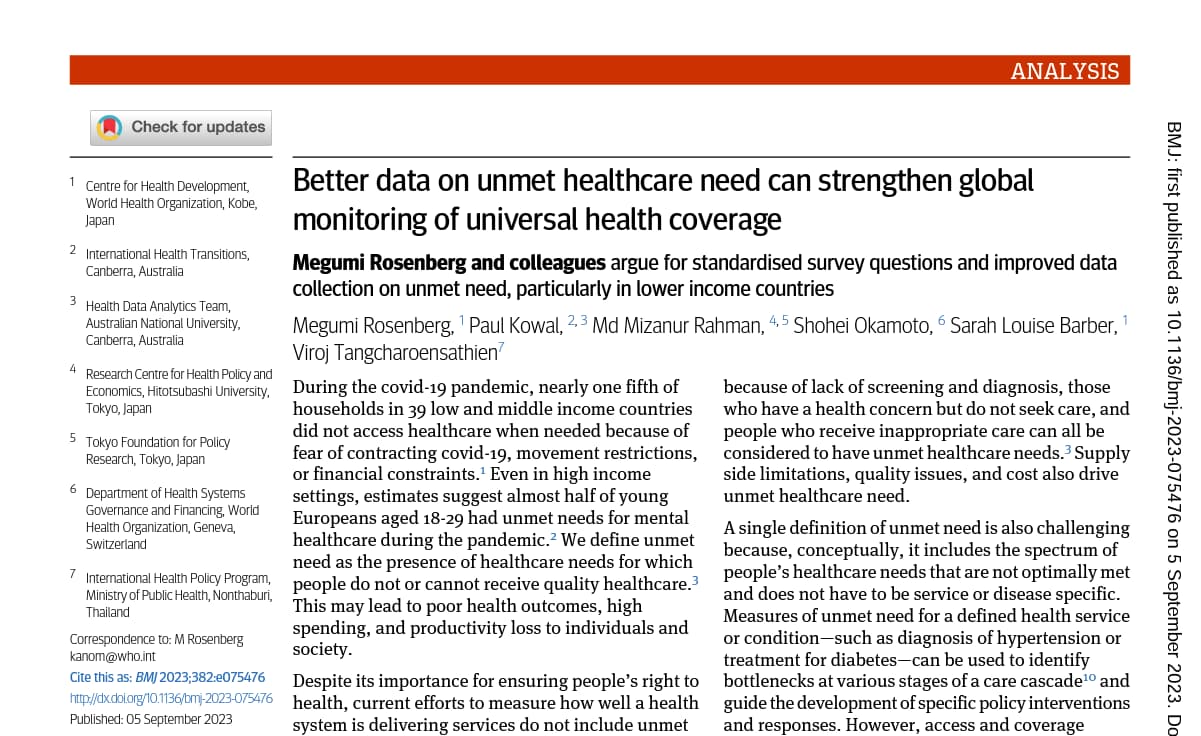
As countries accelerate efforts to advance universal health coverage (UHC), one of the 12 targets of the Sustainable Development Goals on health and well-being, it is essential to effectively track the progress and identify what gaps exist. There are two indicators to measure UHC (health service coverage and catastrophic health spending), but neither captures levels of unmet needs as they only include people who have actually received care. Despite its importance, there is no standardised global data on how many people forgo care and for what reasons. To address this problem, the WHO Centre for Health Development (WHO Kobe Centre – WKC) has been conducting research into the unmet healthcare needs, particularly of older populations.
On 5 September, WKC’s Megumi Rosenberg and Sarah L. Barber, together with WKC Advisory Committee Chair, Viroj Tangcharoensathien and research partners, Paul Kowal, Mizanur Rahman, and Shohei Okamoto, published an article in the BMJ calling for better data on unmet healthcare need to feed into global UHC monitoring. They point out that there is no globally agreed definition of unmet healthcare needs. Defining it is challenging because many factors, such as social determinants of health, individual values, health literacy, and current symptoms, strongly influence the likelihood of having unmet needs. Complexities in defining unmet needs also make its measurement challenging, particularly in low- and middle-income countries where questions about unmet needs are not often asked in population surveys. The authors affirm that a standard operational definition of unmet healthcare needs and reasons for it should be developed. Standardised survey questions are also needed to identify unmet healthcare need that is not bound to a single health intervention or disease and that explains access barriers. These data can help understand the experiences of people with conditions not captured by current UHC indicators and would help track progress toward UHC more precisely.
Some of this WKC research is also featured in the upcoming WHO-World Bank UHC Global Monitoring Report 2023 launched on 18 September. These publications are expected to inform discussions at the United Nations High-level Meeting on UHC in New York City on 21 September 2023. As requested in the 76th World Health Assembly resolution in 2023, it is an opportunity to discuss the importance and feasibility of using unmet needs for healthcare services as an additional indicator to monitor UHC progress.
Details of the relevant research projects WKC and the authors conducted can be found in the following pages.
- Multi-country cross-sectional and longitudinal studies to quantify unmet needs for health and social care among older people
- Systematic review and meta-analysis: financial barriers to accessing health services and unmet healthcare needs
- Household survey analysis of financial hardship due to health spending and unmet care needs of older people in Japan with implications for the Kansai region

